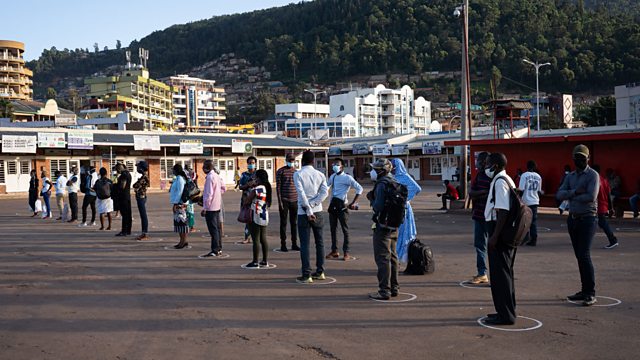Rwanda’s game changing coronavirus test
African scientists have developed a reliable, quicker and cheaper mass testing method
African scientists have developed a reliable, quick and cheap testing method which could be used by worldwide as the basis for mass testing programmes.
The method, which produces highly accurate results, is built around mathematical algorithms developed at the African Institute for Mathematical Sciences in Kigali. We speak to Neil Turok who founded the institute, Leon Mutesa Professor of human genetics on the government coronavirus task force, and Wilfred Ndifon, the mathematical biologist who devised the algorithm.
The virus is mutating as it spreads, but what does this mean? There is particular concern over changes to the spike protein, part of the virus needed to enter human cells. Jeremy Luban has been analysing this mechanism. So far he says ongoing genetic changes seem unlikely to impact on the effectiveness of treatments for Covid -19.
And Heatwaves are increasing, particularly in tropical regions, that’s the finding of a new analysis by climate scientist Sarah Perkins – Kirkpatrick.
Worms are not the cutest of creatures. They’re slimy, often associated with death and tend to bring on feelings of disgust in many of us. But listener Dinesh thinks they’re underrated and wants to know whether earthworms could be the key to our planet’s future agricultural success? He’s an organic farmer in India’s Tamil Nadu province who grows these annelids to add to the soil, and he wants Crowdscience to find out exactly what they’re doing.
Anand Jagatia dons his gardening gloves and digs the dirt on these remarkable creatures, discovering how they can help improve soil quality, prevent fields from becoming waterlogged, and improve microbial numbers, all of which has the potential to increase crop yield.
But he also investigates the so-called ‘earthworm dilemma’ and the idea that in some parts of the world, boreal forest worms are releasing carbon back into the atmosphere, which could have dangerous consequences for climate change.
Main image: People stand in white circles drawn on the ground to adhere to social distancing in Kigali, Rwanda, on May 4, 2020, Photo by Simon Wohlfahrt / AFP via Getty Images
Last on
More episodes
Previous
Broadcasts
- Sat 11 Jul 2020 23:06GMT���˿��� World Service
- Sun 12 Jul 2020 15:06GMT���˿��� World Service News Internet
Podcast
-
![]()
Unexpected Elements
The news you know, the science you don't


